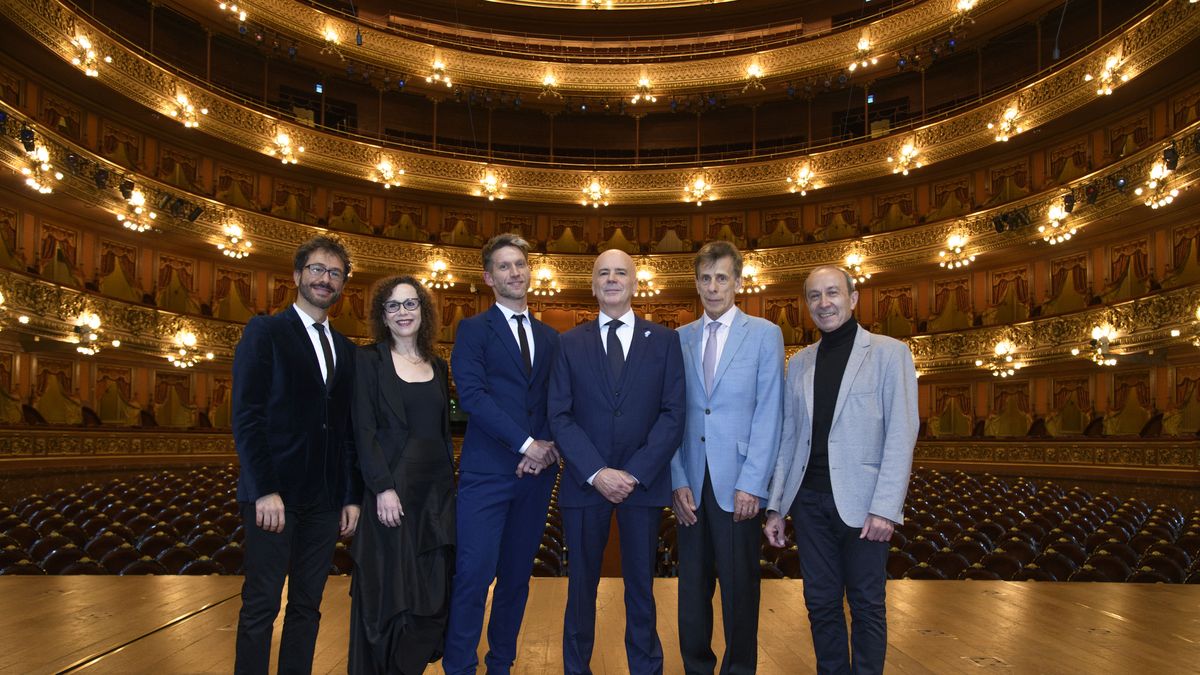Journalist: How will your new team be made up?
Jorge Telerman: There will be a Programming and Production Department in charge of Pablo Maritano, one of the most open and educated heads in these matters, under whom we will incorporate the area of the Studies Department in charge of Marcelo Ayub, a much-loved house teacher and respected, and a great pianist. Augusto Techera will continue in that same specific production space, and we reinforce it with someone who has been working with me for a long time, which is Daniela Cerchiaro.
Q.: The new musical director will be British.
JT: I have summoned Jan Latham-Koenig to this position, undoubtedly one of the great directors on the world stage today. He already knows the Colón and has conducted orchestras on several occasions, including opera titles. His influence will be very strong not only in the titles that he will direct next year, both in opera and with the Philharmonic, but also in the design of the 2023 and 2024 seasons and in the selection of casts. His presence will reinforce the cosmopolitan character of the Colón. Among the changes, is that we are going to present two seasons together, something unusual. We believe that it is a clear sign of medium and long-term work, and of the conceptual foundations on which this management will be based. At the head of the Experimentation Center will be Diana Theocharidis, and next to her Gabriel Caputo as stage director.
Q.: What role will the Autarchic Entity have in this structure?
JT: Its autarkic characteristic works in administrative matters, for example, but ultimately the general organization is that of an institution, and that goes both for an autarkic entity and for a centralized one.
Q.: How is the Philharmonic Orchestra?
JT: It has already been announced that this is the last year of maestro Arturo Diemecke, but beyond that I am talking daily with its members, and we are reaching a kind of consensus that, in addition to the executive direction of Analía Belli, that we are going to reinforce, it will be convenient for the orchestra to work for a while with a group of diverse and very good guest conductors, from Alejo Pérez to Charles Dutoit, until a new conductor is appointed.
Q.: And the budget issue in this time of less than skinny cows?
JT: I am confident that the negotiating capacity of the Colón, due to the prestige granted by acting in it as well as the sensitivity and knowledge that many artists have of the Argentine situation, especially in these moments so marked in relation to the exchange rate, make that our conversations have a framework of rationality. No one is going to come here to lose their money, but many know the importance of performing at the Colón, and especially Argentines because of the extra emotional bond with the place.
Q.: And future seasons?
JT: We are not going to advance any of the titles already scheduled, but the important thing happens elsewhere. I don’t think the discussion is whether a season has to be more traditional or more contemporary, but rather some imprints that we want to mark: the 2023 season and especially the 2024 season will have commissioned works. We will give a lot of emphasis to the commission of works to Argentine artists. The Colón will have resident artists. We will commission Argentine opera, symphonic music and choreographic work. This will not only include musicians but also artists who come from other sectors, such as plastics, technology, to join our seasons in the régie, design and other areas. In fact, the opera that we are commissioning, which will be composed by one of our great musicians, will also have the participation of an artist who does not come from music.
Q.: What other advances can you make?
JT: We will have a series of new subscriptions, aimed at new audiences; the chamber opera will be integrated into our new performance space. Next year the guest country will be Italy. It is not necessary to clarify that it is thanks to its tradition with our theater. There will be a Baroque Music Festival whose realization I entrusted to Verónica Cangemi.
Q.: And there will never be a lack of “L’elisir d’amore” or “Don Pasquale”…
JT: Of course not. The question is, why not review them with a respectful but innovative look? We want that tension between innovation and tradition to be the hallmark of management.
Source: Ambito
David William is a talented author who has made a name for himself in the world of writing. He is a professional author who writes on a wide range of topics, from general interest to opinion news. David is currently working as a writer at 24 hours worlds where he brings his unique perspective and in-depth research to his articles, making them both informative and engaging.




